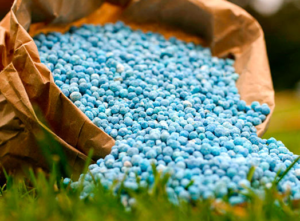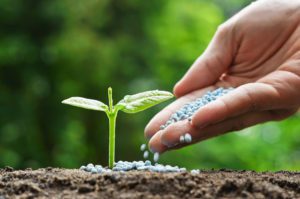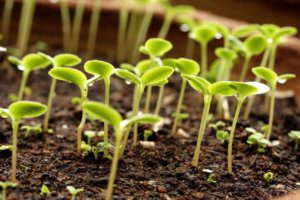
PJSC Azot (Cherkasy), part of Dmytro Firtash’s Group DF, produced 1.42 million tonnes of nitrogen fertilizers in January-November 2019, which is 9.2% more than for the whole of 2018, Group DF’s press service has said.
According to a press release, production of ammonium nitrate for the reporting period amounted to 417,500 tonnes, carbamide some 557,200 tonnes, carbamide-ammonia mixture some 438,100 tonnes. At the same time, production of ammonia was 55,700 tonnes, non-concentrated nitric acid some 507,200 tonnes, and ammonia water some 9,200 tonnes.
“In 2019, we achieved almost 100% loading of our production capacities. The growth in production volumes by the end of the year will be about 10% … For the 11 months of this year, we increased production of carbamide-ammonia mixture by 81% compared to the corresponding period last year (from 240,900 tonnes to 438,100 tonnes). Carbamide production increased by 55%. Nitrate production also increased, but only slightly,” Group DF’s press service said citing Vitaliy Skliarov, the chairman of the company’s board.
Among the main growth factors, the company indicates the antidumping measures of the Interdepartmental Commission on International Trade regarding the supply of fertilizers from the Russian Federation.

The Dniprovsky Plant of Mineral Fertilizers has launched production of the compound fertilizers (NPK) with perspective to produce 75,000 tonnes of NPK by the end of 2019, Vice President of the Union of Chemists of Ukraine Serhiy Liskovsky said.
“A long-term agreement to supply the main raw materials was signed. Every month we’ll produce 15,000-18,000 of the compound fertilizers,” he said.
Liskovsky said that the production program foresees production of liquid nitrogen-phosphate NP fertilizers (8:22), pelleted fertilizers (10:32), and production of the NPK-compound fertilizers (16:16:16) is scheduled for the second half of August.
Liskovsky reminded that for the last five years the plant has been working with the interrupts, by 20-25% of its capacities, in terms of absence of the raw materials inside the country and expensive import.
“For this period a share of Ukrainian enterprises on the domestic market of compound fertilizers dropped by 10% and by 2-3% on some positions,” he added.
According to Liskovsky, state-owned enterprise Sumykhimprom with a capacity of 40,000 tonnes per month also will produce compound fertilizers. By the end of the year, two enterprises aspired to produce 275,000-280,000 tonnes of products.
According to the Chemists Union of Ukraine, Ukraine needs 1.2 million tonnes of compound fertilizers annually, 1.3 million tonnes meant for import.
DNIPROVSKY PLANT, FERTILIZERS, MINERAL FERTILIZERS, NPK, PRODUCTION

The Ukrainian Chemists Union considers it necessary to introduce quotas for imports of fertilizers, which will make it impossible for Russian manufacturers to bypass trade restrictions and load Ukrainian plants at full capacity.
“We propose the introduction of quotas for complex and nitrogen fertilizers for all countries in order to preserve the historical balance of imports. Each country will supply its products to the extent it has historically supplied, this will make impossible for Russian manufacturers to bypass trade restrictions and load the plants at full capacity,” Ihor Holchenko, the vice president of the union and the director for regulatory policy of Group DF, told Interfax-Ukraine.
According to him, this protective mechanism is applied in the countries where there is a threat of damage from growing imports. The introduction of quotas will be preceded by an investigation by the Ministry of Economic Development and Trade. According to Holchenko, quoting will give a clear picture of how much to produce, while regulators will monitor abuse.
The expert said there is no shortage of nitrogen and complex fertilizers in the Ukrainian market: the country provides itself with nitrogen fertilizers, and it can cover 800,000 tonnes that were supplied from the Russian Federation by increasing domestic production.
As for nitrogen fertilizers, Ukrainian enterprises are not loaded at full capacity, as well as for complex ones, where the load is up to 12%. Complex fertilizers in Ukraine are produced by Sumykhimprom and Dniprovsky Plant of Mineral Fertilizers. Ukraine can produce 700,000 tonnes of complex fertilizers, but in 2018 it produced only about 40,000 tonnes.

Ukraine in 2018 exported 341,442 tonnes of nitrogen mineral or chemical fertilizers (according to foreign economic activity code 3102) for $64.446 million and imported 1.358 million tonnes for $288.002 million.
According to the State Fiscal Service, nitrogen fertilizers were delivered to Turkey for $25.092 million, China for $10.3 million, to Romania for $7.584 million, and other countries for $21.47 million.
Last year, imports of nitrogen fertilizers were made from Belarus for $59.684 million, Uzbekistan for $46.235 million, Lithuania for $33.713 million, and other countries for $148.371 million.
Thus, exports of fertilizers last year halved, and in value terms fell by almost two times. Imports of fertilizers decreased by 22.1%, in value terms by 14.6%.
In addition, in 2018 Ukraine exported 40,209 tonnes of ammonia (code 2814) for $9.498 million, imported 441,607 tonnes for $137.333 million.
In 2018, ammonia was exported to Turkey ($4.54 million), Morocco ($2.414 million), Bulgaria ($1.921 million), other countries ($623,000). In 2018, ammonia was imported from the Russian Federation ($134.563 million), Belarus ($2.754 million), Germany ($14,000), and other countries ($2,000).

PJSC Azot (Cherkasy), part of Dmytro Firtash’s Group DF, has started producing new type of mineral fertilizers – a urea-ammonium mixture with sulphur, the enterprise has reported in a press release. Azot Board Chairman Vitaliy Skliarov, the specialized fertilizer segment, which includes the urea-ammonium mixture with sulphur, is actively developed in Ukraine. The plant quickly launched new production.
In 2017, the volume of the Ukrainian market of the urea-ammonium mixture with sulphur was around 45,000 tonnes and demand on it continues growing. Production of the urea-ammonium mixture with sulphur was organized at the basis of the operating facilities of Azot. The production capacity is 36,000 tonnes a year. In September, the enterprise made a first experimental batch of 540 tonnes, which is ready for shipment to customers.
Skliarov said that Cherkasy Azot is not the first Ukrainian enterprise, which started producing the urea-ammonium mixture with sulphur. However, the plant has market advantages compared with small enterprises, which are involved in artisanal production.
The share of ammonium in the finished product is 26-28.5%, the share of sulphur is 2%, ammonium nitrate – 35-37%, ammonium sulfate – 8.2-8.6% and urea – 27-30%.

Agrochemical company Grossdorf (Cherkasy) will open a plant for the production of liquid carbomide-ammonium fertilizers near Khmilnyk (Vinnytsia region) with a capacity of 70,000 tonnes per year and a storage capacity of 3,000 tonnes in the middle of December, the press service of the company has said. “We’ve found a site that suited us, and prepared it properly. Currently, work is underway to manufacture equipment for the plant, then it will be tested at the main production facility, transported to Khmilnyk and installed. These works will take approximately one and a half or two months. Thus, the production will be launched by the end of 2018, and agricultural producers of this region will be provided with carbomide-ammonium fertilizers in the spring season of 2019,” Grossdorf Commercial Director Serhiy Ruban said.
He noted that by the end of the year Grossdorf’s production capacity will reach 480,000 tonnes.
The company said over the past year its strategy has changed somewhat. If earlier focus was made on rail transportation, now the company plans to build factories in the main regions where there is a significant need for fertilizers. This is the third plant that Grossdorf group will launch this year.
Grossdorf agrochemical company was established in 2016. It is engaged in production, import, transportation of fertilizers, as well as providing services for introduction of anhydrous ammonia. Its core business is the supply of basic fertilizers for precision farming.
FERTILIZERS, GROSSDORF, LIQUID CARBOMIDE-AMMONIUM, PLANT, PRODUCTION